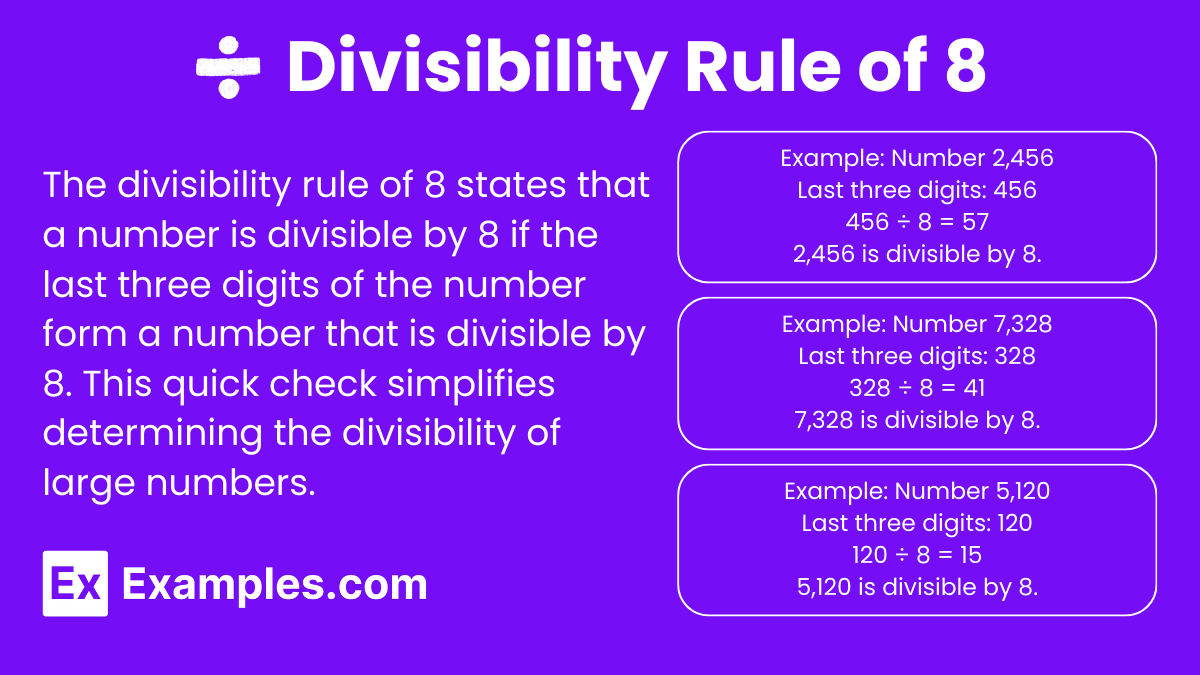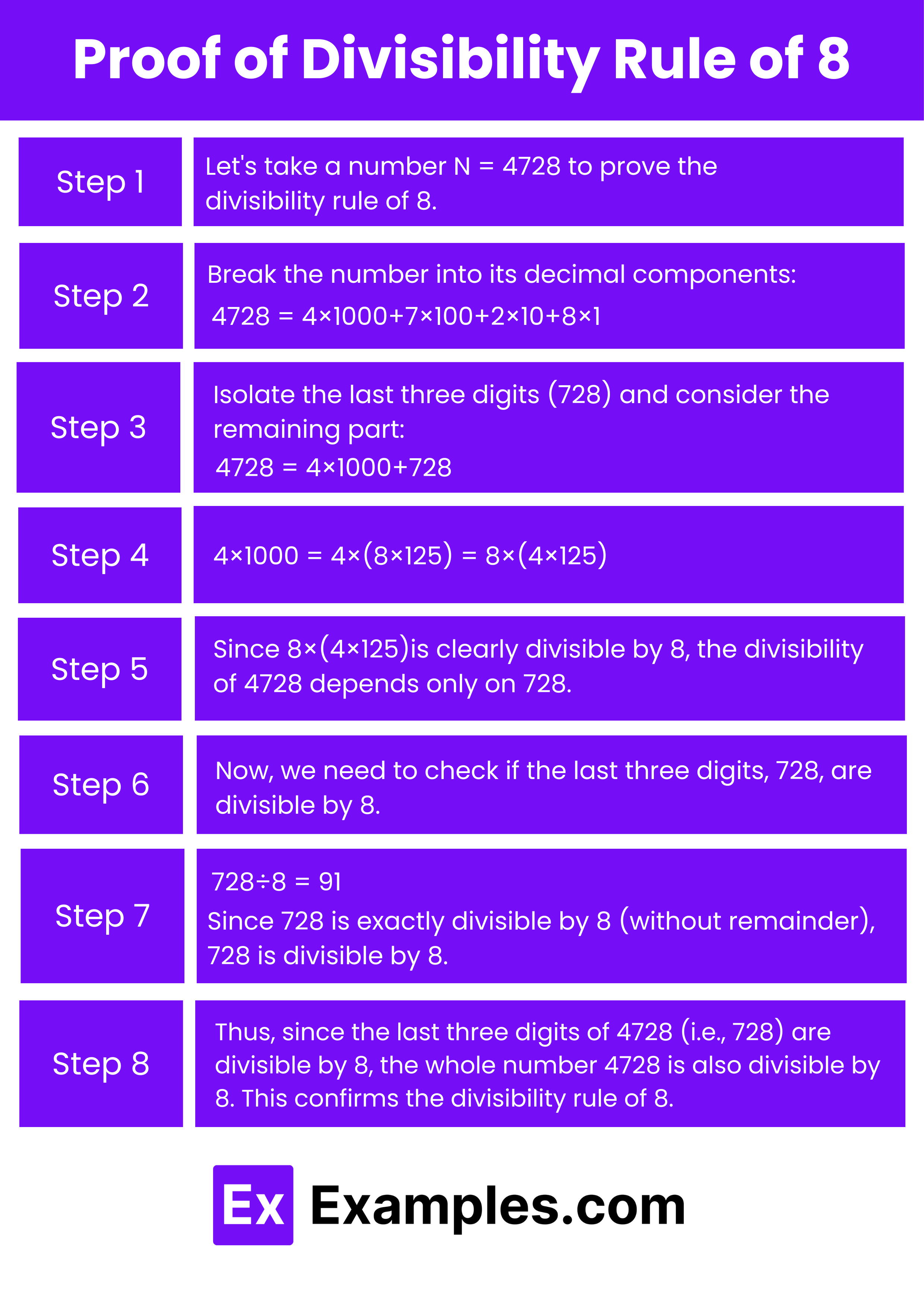Which of the following numbers is divisible by 8?
112
123
135
145


The divisibility rule of 8 states that a number is divisible by 8 if the last three digits of the number form a number that is divisible by 8. This rule simplifies checking large numbers for divisibility. In mathematics, understanding divisibility rules helps in working with various concepts such as rational and irrational numbers, integers, and algebraic expressions. Efficiently performing addition, subtraction, multiplication, and division of numbers often relies on recognizing these divisibility patterns.
Download Proof of the Divisibility Rule of 8 in PDF

Download Proof of the Divisibility Rule of 8 in PDF
Step 1: Consider the Number: Let’s take a number N = 4728 to prove the divisibility rule of 8.
Step 2: Expand the Number: Break the number into its decimal components:
4728 = 4×1000+7×100+2×10+8×1
Step 3: Separate Last Three Digits: Isolate the last three digits (728) and consider the remaining part:
4728 = 4×1000+728
Step 4: Express 1000 in Terms of 8: Note that 1000 can be expressed as 8×125:
4×1000 = 4×(8×125) = 8×(4×125)
Step 5: Divisibility of 8’s Multiples: Since 8×(4×125)is clearly divisible by 8, the divisibility of 4728 depends only on 728.
Step 6: Check Divisibility of Last Three Digits: Now, we need to check if the last three digits, 728, are divisible by 8.
Step 7: Divide the Last Three Digits: Perform the division:
728÷8 = 91
Since 728 is exactly divisible by 8 (without remainder), 728 is divisible by 8.
Step 8: Conclude Divisibility: Thus, since the last three digits of 4728 (i.e., 728) are divisible by 8, the whole number 4728 is also divisible by 8. This confirms the divisibility rule of 8.
A number is divisible by 4 if the last two digits of the number form a number that is divisible by 4.
A number is divisible by 8 if the last three digits of the number form a number that is divisible by 8.
A number is divisible by 8 if the last three digits of the number form a number that is divisible by 8.
A number is divisible by 9 if the sum of its digits is divisible by 9.
A number is divisible by 8 if the last three digits of the number form a number that is divisible by 8.
A number is divisible by 11 if the difference between the sum of the digits in the odd positions and the sum of the digits in the even positions is either 0 or a multiple of 11.
For the number 5831:
Since the difference is not 0 or a multiple of 11, 5831 is not divisible by 11.
For the number 462:
Since the difference is 0, 462 is divisible by 11.
Number: 2,456
Number: 7,328
Number: 5,120
Number: 1,672
Number: 10,024
This rule simplifies the process of determining whether large numbers are divisible by 8 without performing full division, saving time and effort.
Check the last three digits (256). Since 256 ÷ 8 = 32, 7,256 is divisible by 8.
Yes, this rule applies to any whole number, regardless of its size.
Yes, if the number has fewer than three digits, you can directly check if that number is divisible by 8. For example, 64 is divisible by 8 because 64 ÷ 8 = 8.
Check the last three digits (248). Since 248 ÷ 8 = 31, 10,248 is divisible by 8.
You can perform the division of the last three digits by 8. If the result is an integer (no remainder), then the original number is divisible by 8.
The rule for 8 is an extension: a number divisible by 8 is also divisible by 4 and 2. However, a number divisible by 2 or 4 is not necessarily divisible by 8.
Yes, the pattern is that the last three digits form numbers like 000, 008, 016, 024, etc., which are all divisible by 8.
Yes, check the last three digits (888). Since 888 ÷ 8 = 111, 1,234,567,888 is divisible by 8.
Text prompt
Add Tone
10 Examples of Public speaking
20 Examples of Gas lighting
Which of the following numbers is divisible by 8?
112
123
135
145
Is the number 1236 divisible by 8?
Yes
No
Not enough information
Only if it is a multiple of 4
Which number is not divisible by 8?
2008
3080
4444
5624
Which of the following numbers is divisible by 8?
1900
1928
1952
1980
Is 5784 divisible by 8?
Yes
No
Only if it is a multiple of 4
Only if it is an even number
Which number is divisible by 8?
5406
6720
7893
8007
Is 12340 divisible by 8?
Yes
No
Only if it is a multiple of 4
Only if it ends in 0
Which number is divisible by 8?
148
264
372
489
Which of the following is not divisible by 8?
912
1024
2048
3060
Which number is divisible by 8?
4896
5032
5670
6780
Before you leave, take our quick quiz to enhance your learning!

